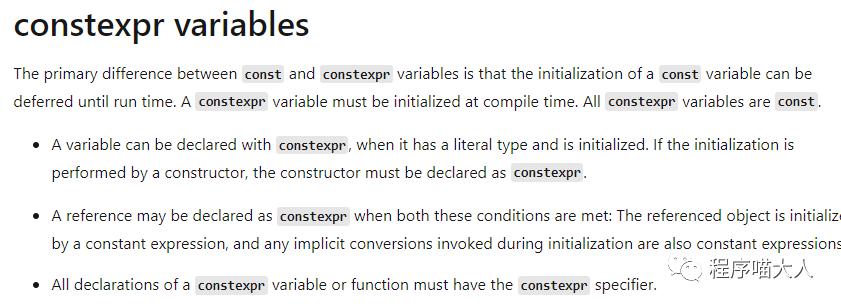前面介绍了模板这种编译期动作,关于编译期动作,有必要介绍下constexpr。
在这之前有必要简单提一下constexpr与const的关系,两者字面上都表达常量的意思。

主要的区别是:const修饰的变量可以在运行时才初始化,而constexpr则一定会在编译期初始化。
constexpr才是名符其实的常量,所有的constexpr都是const。
而const表示的是read only的语义,保证修饰的变量运行时不可以更改,如果直接改动它,编译器在编译时会报错。const修饰的变量可以在运行时才初始化,而constexpr则一定会在编译期初始化。
有人可能会用指针等骚操作来修改const修饰的变量值,这种情况下,CPP标准规定产生的是未定义行为,具体可能不同编译器的具体行为会不相同。所以骚操作魔改const后,无论产生什么行为,都没必要奇怪,也没必要深究。

下面具体介绍下constexpr。
如上所述,constexpr修饰的才是真正的常量,它会在编译期间计算出来,整个运行过程中都不可被改变。
constexpr还可用于修饰函数,这个函数的返回值会尽可能在编译期间被计算出来,然后作为一个常量,但是如果编译期间不能被计算出,此函数就是被当作一个普通函数处理。
如何使用constexpr?
这里我直接贴出cppreference中的示例代码:
#include <iostream>#include <stdexcept>// C++11 constexpr functions use recursion rather than iteration// (C++14 constexpr functions may use local variables and loops)constexpr int factorial(int n) { return n <= 1 ? 1 : (n factorial(n - 1)); }// literal classclass conststr {const char p;std::size_t sz;public:template <std::size_t N>constexpr conststr(const char (&a)[N]) : p(a), sz(N - 1) {}// constexpr functions signal errors by throwing exceptions// in C++11, they must do so from the conditional operator ?:constexpr char operator[](std::size_t n) const { return n < sz ? p[n] : throw std::out_of_range(""); }constexpr std::size_t size() const { return sz; }};// C++11 constexpr functions had to put everything in a single return statement// (C++14 doesn't have that requirement)constexpr std::size_t countlower(conststr s, std::size_t n = 0, std::size_t c = 0) {return n == s.size() ? c : 'a' <= s[n] && s[n] <= 'z' ? countlower(s, n + 1, c + 1) : countlower(s, n + 1, c);}// output function that requires a compile-time constant, for testingtemplate <int n>struct constN {constN() { std::cout << n << '\n'; }};int main() {std::cout << "4! = ";constN<factorial(4)> out1; // computed at compile timevolatile int k = 8; // disallow optimization using volatilestd::cout << k << "! = " << factorial(k) << '\n'; // computed at run timestd::cout << "the number of lowercase letters in \"Hello, world!\" is ";constN<countlower("Hello, world!")> out2; // implicitly converted to conststr}
可以大体观察到constexpr的语法如下:
constexpr literal-type identifier = constant-expression ;constexpr literal-type identifier { constant-expression } ;constexpr literal-type identifier ( params ) ;constexpr ctor ( params ) ;
通过示例代码及相关注释,就可以看到,能在编译期做constexpr就会优先在编译期计算,编译期不行就在运行时计算。
也可以看到,在C++14之前constexpr修饰函数时不能有if-else for循环等语句,而在C++14后,这个问题有了改善。
那什么情况下应该使用constexpr修饰函数?
不在乎编译时间的话,尽可能用constexpr修饰所有的函数,大家有时间可以看看cpp的源码,多数成员函数都是使用的constexpr修饰。
思考题
constexpr有一个条件是需要满足literal type,那literal type究竟是什么类型?
推荐阅读:
https://docs.microsoft.com/en-us/cpp/cpp/constexpr-cpp?view=msvc-170
参考资料
https://en.cppreference.com/w/cpp/language/constexpr
